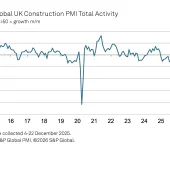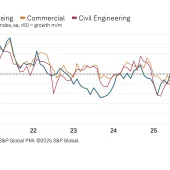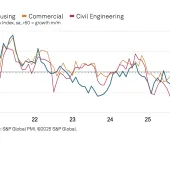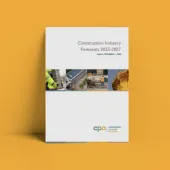Construction activity rises at fastest rate for nine months
February saw strongest rate of growth since May 2022, led by commercial work and infrastructure
FEBRUARY PMI data highlighted a robust increase in overall business activity across the UK construction sector, thereby ending a two-month period of decline. The rate of growth was the strongest since May 2022, supported by a marked rebound in commercial work and a positive contribution from civil engineering activity. In contrast, housing activity decreased for the third month running.
At the same time, the latest survey by S&P Global/CIPS UK pointed to the least widespread supplier delays since January 2020 and a slowdown in input cost inflation. The overall rate of purchase price inflation was the lowest for 27 months in February.
The headline seasonally adjusted S&P Global / CIPS UK Construction Purchasing Managers’ Index (PMI) – which measures month-on-month changes in total industry activity – registered 54.6 in February, up from 48.4 in January and above the neutral 50.0 threshold for the first time in three months. The latest reading was the highest since May 2022.
Commercial construction was the best-performing area in February (index at 55.3), with the rate of expansion the steepest for nine months. Civil engineering activity also returned to growth in February (index at 52.3), although the rate of expansion was only modest.
Construction companies noted a fall in residential building work for the third consecutive month in February (index at 47.4). However, the speed of the downturn had eased since January. Survey respondents commented on subdued market conditions due to elevated interest rates, alongside cutbacks to new house building projects in anticipation of weaker demand.
Total new work picked up in February, as signalled by an improvement in order books for the first time since November 2022. Construction companies reported signs of a turnaround in demand for commercial projects due to the improving near-term economic outlook.
Forthcoming project starts contributed to a modest upturn in purchasing activity during February. Despite rising demand for construction products and materials, the latest survey indicated that supply pressures continued to ease. The respective index signalled that delays with vendor delivery times were the least widespread for just over three years.
A better alignment of demand and supply helped to bring down input price inflation across the construction sector in February. The latest round of purchase price increases was the slowest since November 2020. Higher input costs were mostly linked to suppliers passing on rising energy bills and salary inflation, although this was offset by lower transportation bills.
Business expectations for the year ahead improved further from the 31-month low seen in December 2022. Around 46% of the survey panel anticipate a rise in construction activity over the year ahead, while only 13% predict a decline. The resulting index pointed to the highest level of optimism for one year. Construction firms often noted signs of a recovery in client demand, despite elevated interest rates and recession risks.
Tim Moore, economics director at S&P Global Market Intelligence, who compile the survey, said: ‘Business activity in the UK construction sector returned to growth during February as a rebound in commercial work and civil engineering output helped to compensate for housing market weakness.
‘Some firms noted that fading recession fears and an improving global economic outlook had boosted client confidence in the commercial segment. At the same time, work on major infrastructure projects such as HS2 contributed to the expansion of civil engineering activity in February.
‘Cutbacks to new house-building projects remained the weak spot for construction sector activity, with total residential work falling for the third month running in February. Survey respondents often commented on subdued demand and a headwind from elevated interest rates.
‘Construction companies appear increasingly confident about the year ahead business outlook, with optimism rebounding strongly from the lows seen in the final quarter of 2022. Softer inflationary pressures and the least widespread supplier delays for just over three years were factors supporting business expectations in February.’










